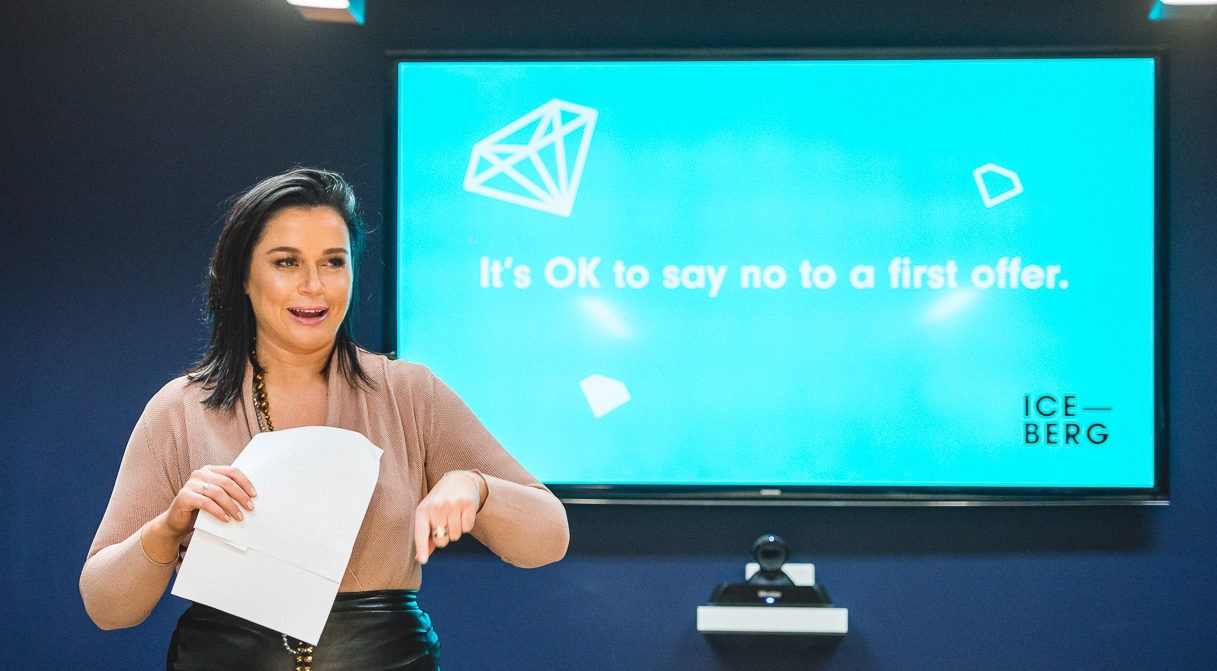Tackling the salary equation at work isn’t everyone’s favourite thing to do, yet demonstrating the ability to negotiate on behalf of yourself and others is at the top of the shopping list for many employers.
It’s not easy and certainly doesn’t come naturally for all of us.
At last month’s Negotiate Your Worth workshop with Miss Collective, we were absolutely bowled over by the courage that attendees demonstrated sharing their challenges on how to tackle the salary equation at work.
Over two hours at co-working space Gravity, 30 courageous men and women joined me to hear tactical ways they could negotiate for better outcomes at work and a salary or package they deserved.
With Miss Collective Co-Founders Steph Webster and Kara Jenkins
Here are three of the most impactful tips I’d recommend to anyone looking to secure a package or salary closer to their value:
It’s OK to say no to a first offer
Contrary to popular belief, you won’t ‘offend’ if you don’t accept the first offer. In fact, it demonstrates you are being considered in your decisions.
When a number that is lower than what you were expecting is presented, it’s perfectly OK to pause and take your time to consider whether it’s right for you.
It’s crucial to acknowledge the request as this offer has been considered at the employer’s side, but not to say yes straight away.
Buy yourself some time if the amount is not what you were expecting by saying you’ll review and come back in 24 hours with some thoughts. Use those 24 hours to outline why you should be paid the number you feel you deserve.
A good way to phrase this can be as simple as, “Thanks for this offer. Let me digest this overnight and come back to you.”
If you don’t have KPI’s – implement them
If you want to increase the size of your salary, it’s crucial you have a benchmark to measure success. Therefore, if you don’t have KPI’s; your performance review or salary offer is the perfect time to discuss this.
It can be challenging if you’re not in a sales roles to identify what success looks like. The good news is: not all KPI’s need to be monetary.
A few ways of thinking about this may include:
- Does my role bring in new business leads?
- Do I grow my current clients organically?
- Do I bring new faces to the organisation through my external networking?
- Do I contribute to a positive working culture? How?
- Do I make problems go away?
- Do I resolve issues, saving the business time and money?
- Have I implemented new processes which have led to cost savings or efficiencies?
- Do my internal relationships contribute to or influence a positive work culture?
- Is the combination of my skills unique to me?
- Are you delivering ‘more’ than what’s in your job description?
- Do my activities outside of work bring value into the business, such as networking with potential business leads, or as a member of a community valued by my organisation?
- Am I a member of organisations outside of work that could have influence with the company that I work for?
Use this opportunity to get creative with KPI’s that can demonstrate your current achievements and set you up for success.
Articulate Your Worth And Mean It
Before going back to your employer, it’s crucial you have the following to back up the claim you should be paid more:
- Facts outlining market rate for your role. (Check out Agency Iceberg’s salary guide or Google your role and market rate).
- Three dot points prepared demonstrating why you are worth more than the offer presented using the above KPI’s.
- Confirmation whether super is inclusive or exclusive (you want the latter!).
Then, rehearse it with your friends, partner, family until you can say it clearly with confidence. Remember, if you don’t firmly believe you are worth the amount on paper, how will someone else?
When you do articulate this, a templated discussion might look like:
“I’ve had time to digest the offer. I believe I am worth $75,000, as opposed to $65,000, and this is why. I deliver value to the business by bringing in my external network as potential clients. I add value to the culture of the organisation by ensuring everyone is happy at work and therefore more likely to stay longer at the firm. I also have here two references from clients sent over the last three months saying how much they’ve enjoyed working for me. I’d love to hear your thoughts.”
Say all of this while maintaining eye contact.
And see what they say. The worst can happen is they say no. And from there, you have clearly stated your value, have examples of impressive performance ready, have articulated your selling points and are ready to continue to negotiate. You can then ask to confirm a date when that number will be realistic.
If that’s at your current organisation, then great. And if not – get in touch with me.




